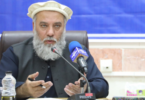John Grady
The Taliban is struggling to govern a drastically changed country in Afghanistan, the nation’s ambassador to the United States said. The difficulties range from a massive humanitarian crisis affecting 18 million Afghans who lack food and medical care to an economic collapse that has closed markets across the country and a festering ISIS terror campaign, Adela Raz said during a Center for New American Security online forum.
Raz, who was appointed ambassador by the government of Ashraf Ghani and remains in Washington, said the Taliban “have to deliver on what they’ve been saying in Doha for two years.” She was referring to negotiations that began under the Trump administration with the Taliban in the Qatar capital on reaching an agreement about the withdrawal of American and NATO forces and the establishment of a new Afghan government where the human rights of women and ethnic and religious minorities are guaranteed.
Lisa Curtis, a former National Security Council senior director for South and Central Asia, said the Biden administration needs to keep its “eyes wide open” in dealing with the Taliban regime before rolling back sanctions imposed on hardline leaders like Interior Minister Sirajuddin Haqqani. This means remaining cautious about claims of changed behavior before unfreezing between $8 billion and $9 billion in assets held in American financial institutions, opening international credit markets, and sending food and medical supplies into a nation where the assistance wouldn’t reach the people who need it the most, Curtis said.
Ultimately, there needs “to be an infusion of cash” into the country to re-open shops and markets to save Afghanistan from an “extremely dire” situation now that will worsen as winter takes hold, she said. Several panelists suggested using non-governmental organizations still in the country to distribute by air or creating a buffer zone so supplies could be moved into Afghanistan for controlled distribution. “We need commitments” before sitting down and talking with the Taliban, Curtis said. The Taliban were known for their severe interpretation of Islamic law and harboring Islamist terrorist groups like al Qaeda, which was responsible for the Sept. 11, 2001 attacks on the United States.
“It doesn’t make any sense to give them formal recognition” as a government without the Taliban’s firm commitment to countering terrorism in the region, an area known for porous borders, and re-instating the gains economic and educational gains that women and minorities made in Afghanistan over the 20 years since their first attempt at ruling was toppled, she said. Raz pointed out that in many instances since 2001, women had become “the breadwinners” for families whose husbands and sons were in the Afghan security forces or had been killed or seriously wounded in the decades of fighting that began before the American intervention.
Naheed Farid, a former member of the Afghan parliament, argued the Taliban, which controlled Afghanistan from 1996 to 2001, cannot be trusted. With their terrorist roots, “they pose an imminent threat to the region” in again harboring extremists, she said. Having already set off a “brain drain” of talented men and women experienced in business and civil administration, the Taliban leaders “do not have … minimum competency” to govern, Farid argued. She and the other panelists noted that in addition to the more than 120,000 who were evacuated before an Aug. 30 deadline for the total withdrawal of American forces from Afghanistan, hundreds of thousands more Afghans who served with or worked with the US, NATO, coalition forces’ non-governmental aid organizations and the local or national government are still looking to leave.
“There are still so many Afghans left” in the country who deserve American help, Curtis added. With more than $6 billion included for Afghan refugees in the continuing resolution to keep the US government functioning into December, she said she believed the Biden administration and Congress “are moving in the right direction” in helping Afghans resettle in the United States and elsewhere. “It’s the least the US government can do,” she said.
Looking at a special group of potential refugees, Lyla Kohistany, who served as a US Navy intelligence officer and was born in Afghanistan, said her organization Operation Pineapple “is desperate to get those commandos,” including women who stood by the Afghan government as it was collapsing through the summer. “They fought to the last bullet,” and supported the US and allied evacuation efforts at Hamid Karzai International Airport in Kabul. Many of them “have gone into hiding” to avoid retribution from the Taliban, Kohistany said.
Since they did not directly work with American forces, ”it’s going to take legislation” to give them special immigration status and visas, Kohistany said. She argued Washington should look to how London is currently handling Afghan refugees and the United Kingdom’s history of welcoming into its military services those who fought alongside British forces, like the Nepalese Ghurkas.
Afghanistan “is a country that has drastically changed” since the Taliban last held power, Raz said. It is also now part of great power competition, where the interests of the United States, the United Kingdom and France do not coincide with those of Russia and China. All five hold permanent seats on the UN Security Council, a body with the power to impose or lift sanctions and deploy peacekeeping forces.






